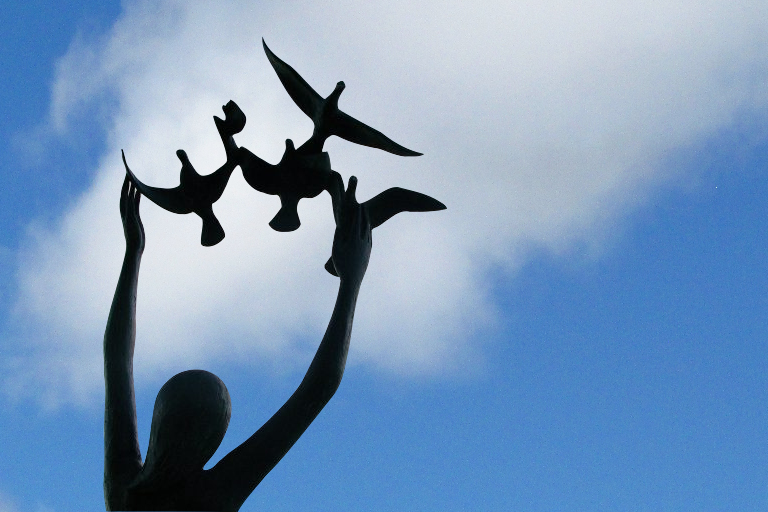Current e-Journal
-

November 1, 2021

The Key to Creating a Better Future
In this newsletter…
- Invitations & Announcements
- Catalytic Thinking Exercise: Taking responsibility for the future
- Resources to Further Your Practice
- Story of the Week: Catalytic Thinking in ACTION
Invitations & Announcements:
SUCCESSION PLANNING:
We are kicking off a brand new way to practice Catalytic Thinking – applying the framework to the real life work of succession planning. If you’ve wanted to create a plan for your nonprofit, social enterprise, or family-run business, this cohort of practice is for you! And if you’ve wanted to practice Catalytic Thinking with a real life example, this cohort is for you as well! Join us here…
Catalytic Thinking Exercise: Taking responsibility for the future
This is the final post in our series on gratitude, service, and responsibility – three factors at the core of Catalytic Thinking. (To see the whole series, click here.)
Infinite gratitude for all things past
Infinite service to all things present
Infinite responsibility for all things future
~ Gotō Zuigan Roshi
The reminder that we are creating the future for everyone whose lives we touch always feels like a wake-up call. Here is how Hildy talked about it in the opening words of her book, The Pollyanna Principles:
Today’s reality is the result of thousands of actions and decisions and occurrences that happened in the unchangeable past.
We cannot change the past, and we cannot change the present. The present - this very moment - is gone the minute we take a breath in and out. That in-breath is in the past, and soon the out breath will join it.
As organizations and as individuals, however, we can indeed create the future.
And we are doing so, right now, whether we do so consciously or not.
What might be possible for your own life, for those you love, for your colleagues at work, for your community - if you lived your life with greater responsibility for the future you are creating?
The answer is simple.
We could absolutely create a more humane, healthy, equitable future for everyone in our lives – a future different from our past.
Try this:
To act with responsibility for the future you are creating, the first step is to be mindful of that fact – that all your actions are creating the future for all those individuals.
So first, acknowledge the effect of your thoughts and your actions upon the people around you. You can do this by asking,
Who will be affected by this decision or action, whether that impact is my intention or not?
By simply identifying who will be affected, you are becoming more aware of the potential results of your actions.
A program that provides laptops to children to enhance their work at school will impact the child's family, and perhaps their neighbors and friends. While the program is not aimed at helping all those individuals, they will absolutely be affected by having a computer in the home.
If you choose to stop right there, you will have taken a huge step towards more responsibly creating the future.
Or you may choose to take the next step, asking…
What do I want the result to be for those people who will be affected?
Those individuals will be affected whether or not that is your intention. What future do you want your decisions and actions to be creating for them? Your actions can then be more mindful of that intention, rather than looking back with regret.
These layers of questions are what it looks like to take responsibility for the future your actions are creating. The more mindful you can be about the ultimate impact of our words, deeds, and decisions, the more you will be taking responsibility for the future you are creating with everything you do.
That is why we named this organization Creating the Future. And it is why responsibility for the future we are creating is baked into every aspect of the Catalytic Thinking framework.
Resources to Support Your Practice:
- LISTEN: Music to keep the energy high as you plan to create the future! A gift from Elva Torres, Executive Director of independent community radio station KXCI. Joyful music here…
- READ: Who are all the various parties that would be affected by Succession Planning at Creating the Future? Here is the long list our board came up with. Read it here
- WATCH: This 3 minute video shares insights into why it is so important to acknowledge all the people who might be affected by any decision we make. Watch it here…
- READ: Part 1 of Hildy’s book, The Pollyanna Principles: Reinventing Nonprofit Organizations to Create the Future of Our World is online right here…
Story of the Week:
This week’s story comes from Mark Friesen. Before heading up Columbia College’s Institute for Equity and Advancement in Vancouver, Mark was a facilitator for groups dealing with challenging situations.
Mark’s experience was like many of yours – initially feeling awkward asking questions outside the norm. However, the more he asked questions like, “What would success look like?” and “Who else might care about this?” the more he watched the energy in the room shift, no matter how difficult the conversation.
“I went to meet with the Board and staff of a housing and homelessness coalition who were worried they might lose their government funding. The tension was palpable. Their list of problems was long, and dealing with it all felt daunting.
Rather than go through the list of problems, I asked one simple question: “What would good look like?” After a moment, the group began coming forward with powerful pathways, different than those they had not contemplated before.
They identified local youth organizations, who had never been involved in the coalition, as prospective partners. They found possibility and excitement in reviving a local event that hadn’t been held for years, with resources that were right there in the room that day. As they worked through each question, they began to reinvigorate the role of the coalition in the community.
And the list of problems? They became irrelevant, almost meaningless in the face of the actionable pathways that became apparent when they shifted their focus away from problems and towards the outcomes they desired for their work.”
Got a Catalytic Thinking story to share with our readers? Let us know here!
Help Keep Our Programs Freely Available
Most of the programs at Creating the Future are free or low cost, with liberal tuition assistance when they aren’t.
If you find our programs of benefit, we hope you will consider contributing, to help keep these programs available to as many people as possible. Donate here ...
eJournal Archives:
If you’re new to our eJournal, or just want to remind yourself of past practice exercises we’ve shared, check out our eJournal archives here.
SUBSCRIBE
to get this e-Journal
Creating the Future is a 501(c)(3) tax exempt organization in the U.S.A


